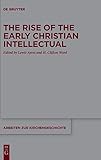The Rise of the Early Christian Intellectual / ed. by Lewis Ayres, H. Clifton Ward.
Material type: TextSeries: Arbeiten zur Kirchengeschichte ; 139Publisher: Berlin ; Boston : De Gruyter, [2020]Copyright date: ©2020Description: 1 online resource (XIII, 272 p.)Content type:
TextSeries: Arbeiten zur Kirchengeschichte ; 139Publisher: Berlin ; Boston : De Gruyter, [2020]Copyright date: ©2020Description: 1 online resource (XIII, 272 p.)Content type: - 9783110607550
- 9783110608007
- 9783110608632
- 200.9 22
- BR129 .R57 2020
- online - DeGruyter
- Issued also in print.
| Item type | Current library | Call number | URL | Status | Notes | Barcode | |
|---|---|---|---|---|---|---|---|
 eBook
eBook
|
Biblioteca "Angelicum" Pont. Univ. S.Tommaso d'Aquino Nuvola online | online - DeGruyter (Browse shelf(Opens below)) | Online access | Not for loan (Accesso limitato) | Accesso per gli utenti autorizzati / Access for authorized users | (dgr)9783110608632 |
Frontmatter -- Contents -- Preface -- Abbreviations -- Introduction and Acknowledgments -- Crazy Guy or Intellectual Leader? -- Papias’s Appeal to the “Living and Lasting Voice” over Books -- Tatian, Celsus, and Christianity as “Barbarian Philosophy” in the Late Second Century -- Intellectual independence in Christian and medical discourse of the 2nd–3rd centuries -- Clement and the Catechumenate in the Late Second Century -- Platonism and Stoicism in Clement of Alexandria: “Becoming like God” -- Irenaeus and the ‘Rule of Truth’: A Reconsideration -- Christian, Jewish, and Pagan Authority and the Rise of the Christian Intellectual -- Eusebius’ Gospel Questions and Aristarchus on Homer—Similar Strategies to Save Different ‘Sacred’ Texts -- Bibliography -- Index locorum -- General Index
restricted access online access with authorization star
http://purl.org/coar/access_right/c_16ec
The study of the growth of early Christian intellectual life is of perennial interest to scholars. This volume advances discussion by exploring ways in which Christian writers in the second century did not so much draw on Hellenistic intellectual traditions and models, as they were inevitably embedded in those traditions. The volume contains papers from a seminar in Rome in 2016 that explored the nature and activity of the emergent Christian intellectual between the late first century and the early third century. The papers show that Hellenistic scholarly cultures were the milieu within which Christian modes of thinking developed. At the same time the essays show how Christian thinkers made use of the cultures of which they were part in distinctive ways, adapting existing traditions because of Christian beliefs and needs. The figures studied include Papias from the early part of the second-century, Tatian, Irenaeus, and Clement of Alexandria from the later second century. One paper on Eusebius of Caesarea explores the Christian adaptation of Hellenistic scholarly methods of commentary. Christian figures are studied in the light of debates within Classics and Jewish studies.
Issued also in print.
Mode of access: Internet via World Wide Web.
In English.
Description based on online resource; title from PDF title page (publisher's Web site, viewed 28. Feb 2023)


